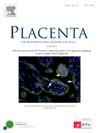Homeobox genes in the human placenta: Twists and turns on the path to find novel targets
IF 3
2区 医学
Q2 DEVELOPMENTAL BIOLOGY
引用次数: 0
Abstract
Fetal growth restriction (FGR) is a clinically important human pregnancy disorder that is thought to originate early in pregnancy and while its aetiology is not well understood, the disorder is associated with placental insufficiency. Currently treatment for FGR is limited by increased surveillance using ultrasound monitoring and premature delivery, or corticosteroid medication in the third trimester to prolong pregnancy. There is a pressing need for novel strategies to detect and treat FGR at its early stage. Homeobox genes are well established as master regulators of early embryonic development and increasing evidence suggests they are also important in regulating early placental development. Most important is that specific homeobox genes are abnormally expressed in human FGR. This review focusses on identifying the molecular pathways controlled by homeobox genes in the normal and FGR-affected placenta. This information will begin to address the knowledge gap in the molecular aetiology of FGR and lay the foundation for identifying potential diagnostic and therapeutic targets.
人类胎盘中的同源染色体:寻找新靶点的曲折之路
胎儿生长受限(FGR)是临床上一种重要的人类妊娠疾病,被认为起源于妊娠早期,虽然其病因尚不十分清楚,但这种疾病与胎盘功能不全有关。目前,对 FGR 的治疗仅限于加强超声波监测、早产或在妊娠三个月内使用皮质类固醇药物来延长妊娠期。目前迫切需要新的策略来早期检测和治疗 FGR。同源体基因是早期胚胎发育的主要调控因子,越来越多的证据表明它们在调控早期胎盘发育方面也很重要。最重要的是,特定的同源染色体基因在人类 FGR 中表达异常。本综述的重点是确定正常胎盘和受 FGR 影响的胎盘中由同源体基因控制的分子通路。这些信息将有助于填补 FGR 分子病因学方面的知识空白,并为确定潜在的诊断和治疗靶点奠定基础。
本文章由计算机程序翻译,如有差异,请以英文原文为准。
求助全文
约1分钟内获得全文
求助全文
来源期刊

Placenta
医学-发育生物学
CiteScore
6.30
自引率
10.50%
发文量
391
审稿时长
78 days
期刊介绍:
Placenta publishes high-quality original articles and invited topical reviews on all aspects of human and animal placentation, and the interactions between the mother, the placenta and fetal development. Topics covered include evolution, development, genetics and epigenetics, stem cells, metabolism, transport, immunology, pathology, pharmacology, cell and molecular biology, and developmental programming. The Editors welcome studies on implantation and the endometrium, comparative placentation, the uterine and umbilical circulations, the relationship between fetal and placental development, clinical aspects of altered placental development or function, the placental membranes, the influence of paternal factors on placental development or function, and the assessment of biomarkers of placental disorders.
 求助内容:
求助内容: 应助结果提醒方式:
应助结果提醒方式:


